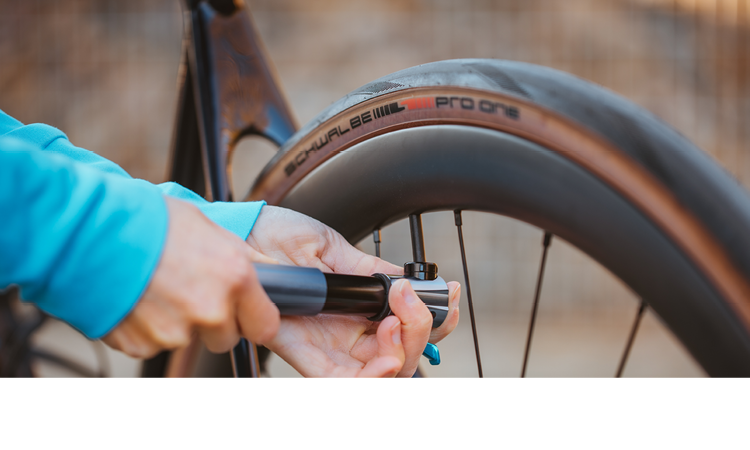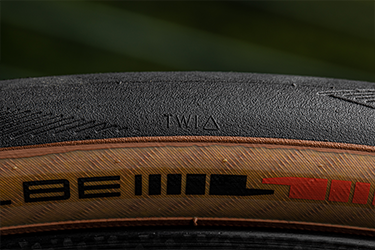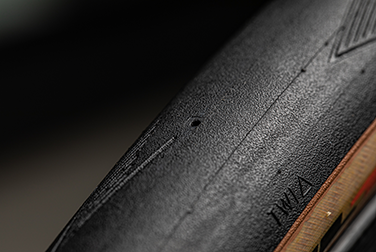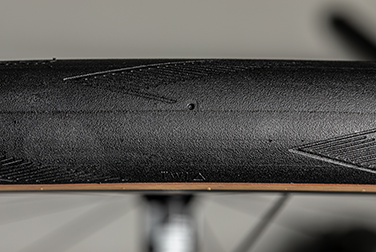WHEN IS A TIRE WORN OUT?
In bicycle tires the tread is far less important than for instance in car tires. So using a tire with a worn out tread is less of a problem that is of course with the exception of MTB tires.
When the puncture protection belt or the carcass threads can be seen through the tread the tire has reached its wear limit and must be replaced. As puncture resistance also depends on the thickness of the tread layer, it may be useful to replace the tire sooner.
The sidewalls of tires often fail before the tread is worn out. In most cases, this premature wear is due to prolonged use of the tire with insufficient pressure. Checking and re-pumping the inflation pressure at least once a month with a pressure gauge is most important.

Tread is worn out. Rubber is still present.
This tire could still be ridden.

The puncture protection layer can be seen.
The tire must be changed urgently.
ARE THERE ANY OTHER WEAR INDICATORS?
For road bike tires, the integrity of the tread rubber is an important factor for performance and safety. Our high-end road bike tires of the Schwalbe Pro One series are therefore equipped with special wear indicators. The small indentations in the tread indicate how far a tread can be worn down before the tire should be replaced. A total of four of these indicators are distributed over the tread of a Schwalbe Pro One road bike tire. The exact position of the indicators is marked on the sidewall of the tire via arrows and the abbreviation "T.W.I.". The abbreviation T.W.I. stands for Tread Wear Indicator.
WHAT MILEAGE CAN BE ACHIEVED WITH VARIOUS TIRES?
It is difficult to answer this question, as mileage is influenced greatly by tire pressure, load, road surface, temperature and the rider. For example, when used in hot weather with a heavy load and on rough asphalt, a tire wears much faster. As a general guide, you can expect a tire mileage of 2000 to 5000 km from Schwalbe standard tires. The tires of the Marathon family usually last between 6000 and 12000 km. With the light Marathon Racer and Marathon Supreme, the performance is a little lower (approx. 5000 to 9000 km). The Marathon Plus is outstanding with its extremely high mileage of often much more than 10000 km. No useful mileage data is possible for MTB tires, because the influence of riding style is too dominant.
WHY DO MANY TIRES WEAR PREMATURELY?
Unfortunately, many tires do not reach the possible mileage because they are continually ridden at inflation pressures that are too low. Insufficient inflation pressure means the tire cannot bear heavy loads. The tire sides have to deform excessively when running. The tire can only stand this kind of treatment for a limited time. At a certain point there is too much load on the sidewall and it tears.
Fig. 1 shows the typical fatigue cracks, which arise from low inflation pressure. A few large cracks in the upper area of the sidewall. In comparison the second figure shows normal aging cracks (due to old age and/or poor rubber compound). These cracks are rather small and distributed evenly across the whole sidewall. In practice the transition between these two crack types is often seamless so that the cause is not always clearly visible.
Figures 3 to 5 also show clear symptoms of continued riding with insufficient inflation pressure. Typical abrasion marks: The tire is not bald in the center but on the left and right sides. Typical 'walk' traces in the tire and on the tube.

1. Fatigue cracks

2. Aging cracks

3. Abrasion marks

4. Walk traces
WHY DO TIRES OF MULTI-TRACK VEHICLES OFTEN WEAR DOWN SO FAST?
Unsere Reifen sind - in der Regel - für Fahrräder konzipiert und damit für mehrspurige Fahrzeuge wie z. B. Dreiräder nicht immer optimal geeignet.
Anders als bei einem (einspurigen) Fahrrad kann sich ein Dreirad üblicherweise nicht in die Kurve neigen. In der Kurve „schiebt“ das Fahrzeug dann quer zur Fahrtrichtung über die eingelenkten Vorderräder (Untersteuern). Abhängig vom Fahrstil und von der Konstruktion des Fahrzeugs kann dieser Effekt zu einem deutlich höheren Verschleiß führen.
Bei extrem hohem Verschleiß, z. B. wenn der Reifen bereits nach weniger als 1.000 km abgefahren ist, liegt die Ursache meist darin, dass die Spur des Fahrzeugs nicht korrekt eingestellt ist. Selbst bei Geradeausfahrt erzeugen die zur Fahrtrichtung „schief“ stehenden Reifen erhöhte Reibung und somit übermäßigen Verschleiß.
Das Gleiche gilt auch für Anhängerreifen. An einem Fahrradanhänger müssen die Reifen in Regel weder Antriebs- noch Lenkkräfte übertragen. Deswegen ist der Abrieb normalerweise sogar deutlich geringer als an einem Fahrrad. Wenn hier auffallend starker Verschleiß auftritt, dann hat es mit sehr großer Wahrscheinlichkeit etwas mit der Spureinstellung des Anhängers zu tun.
HOW LONG CAN A TIRE BE STORED?
Schwalbe tires can be stored for up to 5 years without issue. If possible, they should be stored in a cool, dry and, most importantly, a dark place. When stored properly, even longer storage times may be possible.
If fitted on a rim, tires should always be inflated or the bicycle should be hung up for storage. A bicycle left on flat tires for an extended period of time may damage the sidewalls of the tire.
THIS MAY ALSO BE OF INTEREST FOR YOU

WHY AIR PRESSURE IS SO IMPORTANT
The tire is only able to carry the bicycle and rider if it has sufficient air pressure. On the road, the following applies for very smooth surfaces: the higher the air pressure, the lower the tire's rolling resistance. The susceptibility to punctures is also lower at high pressure; particularly from pinch flats. Air pressure that is permanently too low often leads to premature tire wear with cracking of the sidewall being a typical result. The abrasion wear is then also unnecessarily high. Conversely, an under-inflated tire absorbs road shocks better. Wide tires are generally used at lower inflation pressures. The larger air volume is advantageous in that it absorbs road bumps and holes, but does not necessarily suffer from higher rolling resistance, less puncture protection or tire wear. Tubeless tires can also be used at lower inflation pressure. Our overview gives you an indication of the "right" air pressure for your bicycle tires.
.png)
Tired of punctures? Here's how to avoid them
With high-quality tires and a reliable puncture protection belt, you're already on the right track! Get more information on how to best protect your tires against unpleasant punctures and enjoy a carefree ride.






